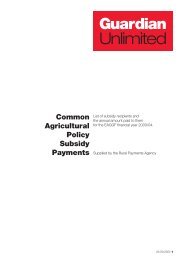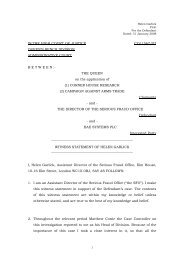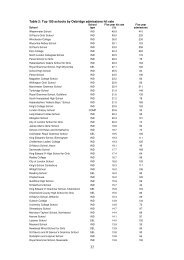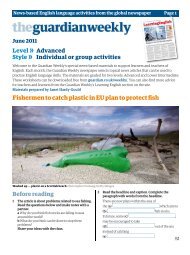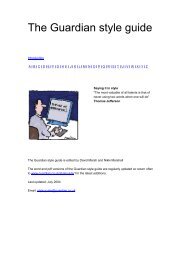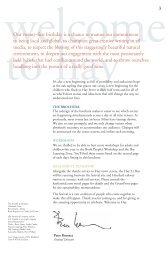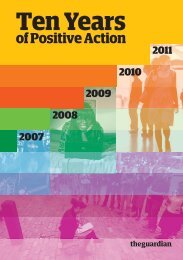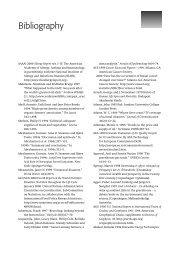KATINE COMMUNITY PARTNERSHIPS PROJECT - Guardian.co.uk
KATINE COMMUNITY PARTNERSHIPS PROJECT - Guardian.co.uk
KATINE COMMUNITY PARTNERSHIPS PROJECT - Guardian.co.uk
You also want an ePaper? Increase the reach of your titles
YUMPU automatically turns print PDFs into web optimized ePapers that Google loves.
� Increased <strong>co</strong>mmunity access to and utilisation of improved water and sanitation<br />
facilities<br />
� Improved hygiene practices in households<br />
� Improved operations and maintenance of water sources<br />
Livelihoods<br />
� Re<strong>co</strong>very of livelihoods through diversified and improved sources of in<strong>co</strong>me<br />
� Stronger ability of rural institutions to access both advisory services and markets for<br />
their products for increased production and in<strong>co</strong>me<br />
� Community demanding and achieving their rights and services<br />
Community Empowerment<br />
� Increased <strong>co</strong>mmunity capacity to plan and budget for <strong>co</strong>mmunity needs<br />
� Stronger <strong>co</strong>mmunity capacity for data gathering and utilisation<br />
3.4 Implementation Strategy<br />
AMREF uses three overarching strategies in all of its projects throughout Sub-Saharan Africa.<br />
Community Partnering: The project’s entry point into the <strong>co</strong>mmunity is through partnering with<br />
existing groups and <strong>co</strong>mmunity structures. The aim is to empower <strong>co</strong>mmunities to take full<br />
supervision of their development process and ensure sustainability beyond the life of the<br />
KCPP.<br />
Capacity-Building: This aims to develop the human resources and service delivery systems in<br />
both the <strong>co</strong>mmunities and local governments to manage development projects. The<br />
development of these local institutions and organisations enhances effectiveness,<br />
sustainability and local ownership.<br />
Operations Research and Advocacy: The project will monitor and evaluate progress,<br />
document lessons learnt and share them with others. Lessons learnt from this project will be<br />
used to inform and influence policies and practices in health and development sectors among<br />
governmental and non-governmental partners.<br />
3.5 Sustainability Plan & Phase-Out Strategy<br />
The KCPP builds on existing <strong>co</strong>mmunity based and local government structures. Some of<br />
these structures include village health teams, school management <strong>co</strong>mmittees, parent-teacher<br />
associations and water source <strong>co</strong>mmittees. In addition, KCPP also works with parish<br />
sanitation <strong>co</strong>mmittees, sub-<strong>co</strong>unty thematic groups, hygiene and sanitation working groups,<br />
sub-<strong>co</strong>unty water and sanitation steering <strong>co</strong>mmittees, health centre unit <strong>co</strong>mmittee, farmer’s<br />
forums and <strong>co</strong>mmunity animal health workers. The <strong>co</strong>mmunity structures have different roles<br />
KCPP six monthly narrative report - October 2007 to March 2008 12





